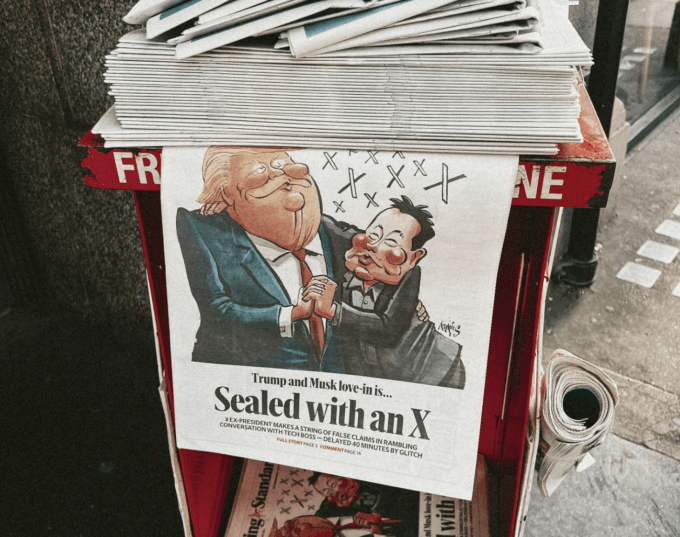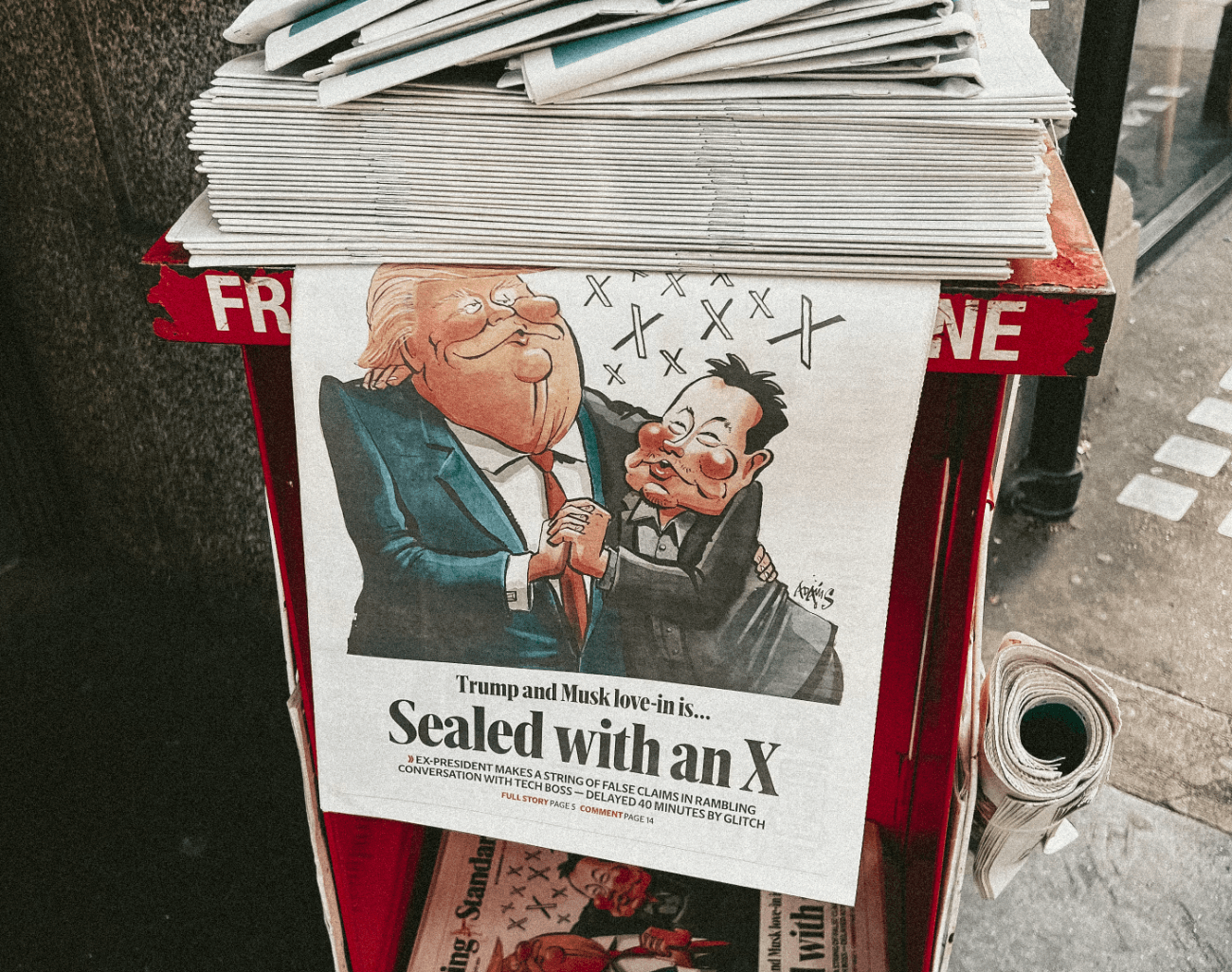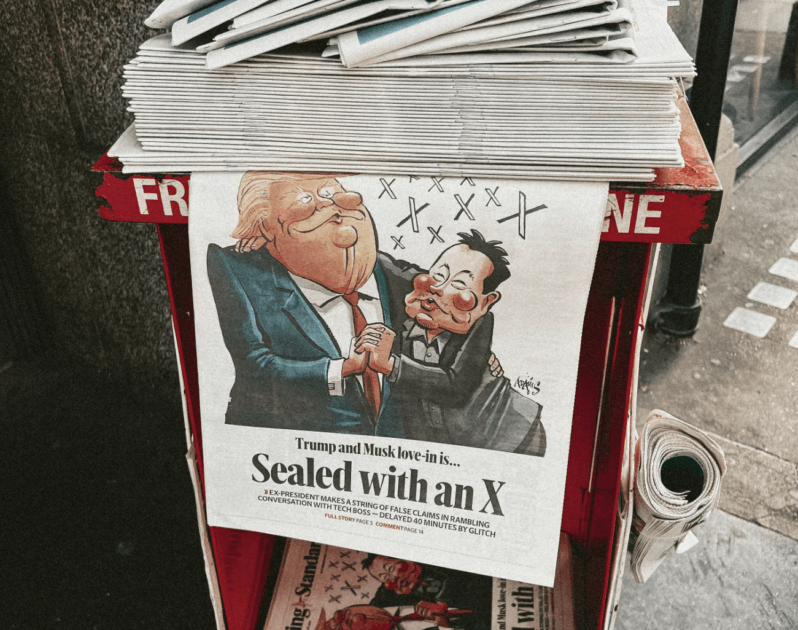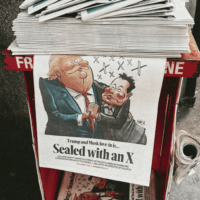






























































Image by Samuel Regan-Asante.
What put the U.S. Agency for International Development (USAID), with an annual budget hovering at just about 1% of federal spending, at the top of Elon Musk’s budget-cutting target list? Was it just a political calculation that foreign aid is a safe target because it’s unpopular with so many Americans and cutting those funds will only hurt foreigners, not U.S. voters? Or was Musk motivated by some other grudge we haven’t even heard about?
A related question: Why is his invective about that particular agency — “a criminal organization,” “a viper’s nest of radical-left Marxists who hate America,” and similar blasts — so much more inflammatory in tone and content than his statements about other government programs?
As reported by various news organizations, one of Musk’s principal influencers on this issue appears to have been a man named Mike Benz, who served in the Department of Housing and Urban Development and briefly in the State Department during President Trump’s first term. Benz has spent the last few years promoting implausible conspiracy theories about USAID — that it played a key role in paying for the 2019 attempt to impeach Trump, that it financed the creation of the Covid virus in a Chinese laboratory, that it funds “all the terrorist groups in Pakistan [and] terrorist groups in the Sahel in Africa,” and numerous other wildly exaggerated or completely unfounded charges. Benz seems to have been the source of a number of Musk’s specific allegations, most of them unsupported by any evidence, about corrupt or unjustified foreign aid projects.
This record leads to another question: What does Elon Musk really know about U.S. foreign aid, the agency staff that delivers it, or the people who receive it? Besides listening to Mike Benz’s falsehoods, has he made any effort to do his own investigation? Has he ever personally seen a recipient of U.S. foreign aid, or someone whose job is to deliver it? Has he ever come face to face with a West African who depends on USAID for lifesaving medicine against deadly tropical disease, or a family driven from their home by war in Afghanistan, Sudan, or Ukraine, or one of the hundreds of thousands of hungry children in Haiti who face starvation without USAID food assistance? Has he ever spoken directly with anyone who could tell him first-hand about the work USAID staffers do, the people they help, or the hardships and dangers they often face on the job?
Someone like Christine Sheckler perhaps?
A Life Helping Others
Christine Sheckler, now retired, spent 27 years working for USAID, including two years in wartime Iraq. Other postings included tours in Sierra Leone, then recovering from a decade of civil war that had left 50,000 people dead and driven more than two million from their homes, as well as in several former Soviet republics, Pakistan, and other countries. In the real world, it’s an all-but-sure bet that she will never have a conversation with Elon Musk, but I’ve wondered what such a conversation might have been like, and whether Musk might have modified his views in any way after listening to her — say, as a start, about her experiences in Iraq.
Sheckler served in Iraq from 2008 to 2010, the years when Musk was putting his first Teslas on the road and (one can guess) paying little attention, or possibly none at all, to America’s already disastrous war in Iraq, Americans serving there, or the war’s impact on Iraqi civilians. She did not spend those years in the Green Zone, the well-protected seven-square-mile enclave in Baghdad where the American embassy and buildings housing the Iraqi government stood behind concrete and barbed-wire barriers and checkpoints manned by U.S. and other allied troops who controlled all traffic into or out of the area. Sheckler was based in the much more dangerous Red Zone, in the district of Abu Ghraib, a prominent staging area for insurgent attacks (and the site of the notorious prison of the same name where American troops brutalized Iraqi inmates).
“It was hard,” Sheckler says, recalling her time there. “Every minute was dangerous.” In the course of her work, focused on helping farmers, small-business owners, and local governments, she regularly traveled to less secure areas of the region, often meeting with local sheikhs. In those meetings, she took off her helmet and other protective gear, a “calculated risk,” to avoid sending a message that she didn’t trust the Iraqis she was dealing with.
On two occasions, her work put her in immediate danger. The first was at a small building in downtown Baghdad where Sheckler had attended a meeting of the Baghdad local city council. She had just left in an armored vehicle (the type commonly called an MRAP, for Mine-Resistant Ambush Protected), heading for the nearby U.S. embassy, and had ridden only a few blocks when the driver was ordered to turn around because the city council had just been attacked. After parking a block away, in case of another attack, Sheckler and several other passengers walked the rest of the way back to the council building, where a suicide bomber driving a vehicle loaded with explosives had been stopped by a barricade in front of the building and had then smashed into a parked MRAP outside the wall, setting off his blast. The bomber was killed, along with the driver and a passenger in a taxi following his vehicle, but although the explosion shattered parts of the roof of the council building and blew out all its windows, showering the people inside with broken glass, “by some miracle,” as Sheckler put it, there were no other casualties.
Some months later, she was riding in a vehicle immediately behind the Humvee (a military truck) at the head of a convoy, when a small white car coming from the opposite direction rolled to a stop a short way ahead. From her car, just 20 feet behind the lead vehicle, she saw a man get out with a phone in his hand, which he then used to set off an EFP (an explosively formed penetrator, a projectile carrying a superheated copper warhead that can be launched from a distance and punch through most protective armor). The blast blew the Humvee into the air, sending it flying into a pasture on the far side of the road, wounding the three soldiers and a civilian riding in it. The most seriously wounded was the driver, who lost his right leg below the knee and suffered a shattered lower left leg and massive internal and external burns. Sheckler knew him and all her convoy soldiers, since the same unit escorted her every day on her travels around the district.
A project she remembers with particular pride from her time in Iraq was the reconstruction of the University of Baghdad College of Agriculture, located in Abu Ghraib, which had been completely destroyed earlier in the war. With USAID help, the college was rebuilt, including a room with audiovisual equipment so students and instructors could communicate with other schools. When it reopened, the school offered local farmers training in improved methods of irrigation and water use, helping to revive dairy farming and grain harvests in a vital food-producing region.
It was an “important partnership,” Sheckler said, which not only benefited Iraqi farmers but also significantly changed local feeling about the American presence, as one sheikh after another told her at a farewell meeting at the end of her tour. “When Christine came here two years ago, we hated America and we hated the American people,” she remembers one of them saying as they sent her off with a gift. “But if Christine represents the American people, we love the American people.”
Summing up her time in Iraq, Sheckler remembers not just the danger and her arduous daily schedule (“6 a.m. to after midnight, pretty much every day”) but the immense satisfaction she drew from the work she did. “We spent a lot of money doing supergood things and I am superproud of that.”
She’s no less proud of her work in other countries, particularly during local council elections in the African country of Sierra Leone, where women hoped for more representation in a society in which, as one international think tank reported in 2009 during Sheckler’s tour there, “Gender relations… are extremely unequal and Sierra Leonean women face high levels of exclusion, violence, and poverty.” Gender inequality became a more visible issue in the aftermath of the 1990s civil war there, when huge numbers of women became victims of sexual violence or endured devastating hunger and poverty after their husbands were killed.
Working with a team from the National Democratic Institute, a nongovernmental organization, Sheckler helped bring female ministers and parliamentarians from all over Africa to find local women throughout Sierra Leone with leadership skills and meet, encourage, and mentor women candidates in the elections. The delegation traveled around the country, riding in old vehicles on rough roads, often crossing paths with Sheckler, who was also on the move to monitor and evaluate the results of the election strategy and leadership training. In the end, in a genuine breakthrough, women won 20% of the local council seats, up from 11% in the previous councils. That result left Sheckler feeling “superproud,” not just about her own contribution but perhaps more importantly about “the strength, wisdom, determination, and resilience of the Sierra Leonean women” she had worked with.
Would Musk Listen?
Now, let’s return to Elon Musk, and imagine the Tesla chief and DOGE warrior’s conversation with Sheckler. Obviously, there’s no way to know if hearing her reminiscences would have moderated any of his opinions or policy decisions when it came to the utter dismantling of AID. Possibly, perhaps probably, no one like her would change his thinking an iota. This is the guy, after all, who believes that empathy is “the fundamental weakness of Western civilization” because it can supposedly be, as he put it, “weaponized” by enemies to exploit our humane impulses for sinister purposes. And one wonders if Musk can even begin to comprehend a life built around helping other people, or any other purpose except personal gain.
He may think that American soldiers have no obligation to ease civilian suffering in war — a view that President Trump’s defense secretary Pete Hegseth apparently adopted as official policy when he moved to shut down the Civilian Harm Mitigation and Response office and other Defense Department programs aimed at preventing civilian harm (or at least responding to it) during U.S. combat operations. Accordingly, rather than thanking Sheckler for her work in Iraq, he might argue that she should never have been sent there in the first place. Similarly, it would be no surprise if Musk believes that the U.S. has no business interfering with the oppression of women in Sierra Leone or anywhere else, and so sees Sheckler’s project there and similar programs elsewhere not as steps toward greater fairness but as a pure waste of American taxpayer dollars (if, indeed, he accepts the idea that women’s rights are a legitimate issue in the first place, which is by no means a certainty).
So, it’s not unreasonable to imagine that talking to Musk would be a complete waste of Sheckler’s time. As a possible alternative, she could tell her stories to Republican members of Congress, particularly those who loudly proclaim their Christian faith, which might suggest a different view from Musk’s about empathy (though again I wouldn’t count on it). In that scenario, if Sheckler manages to speak with any senators or representatives, perhaps she could see them together with Nicholas Kristof, the New York Times journalist whose eyewitness reporting in Sudan and Kenya documented the deaths of a number of children and adults directly attributed to the suspension of U.S. foreign aid programs — conclusively refuting Musk’s false claim that no one had died because of the USAID cutback.
Maybe listening to Sheckler and Kristof together would persuade at least a few Republican lawmakers to break their shameful silence. Perhaps they would not only speak out against Musk’s and Trump’s assault on USAID, but act to restore fired employees and reinstate discontinued aid programs. That would not save lives already lost or prevent many more unnecessary deaths caused by the interruptions in AID programs that have already occurred but could help limit the toll in future years. So far, regrettably, there’s no sign that anything like that will happen.
When Musk, Trump, and their subordinates speak about USAID programs or government spending in general, they incessantly repeat the words “waste, fraud, and abuse.” Waste is a legitimate issue, more so in some agencies than others. But by any realistic standard, fraud and abuse come overwhelmingly from the Trump-Musk side, not from federal employees. Fraud is the right word for their false reasoning and wildly exaggerated claims of dollars saved, and the record shows abuses too numerous to count — false claims of poor performance by fired government workers, disrupting mental health services for veterans, attempting to intimidate judges whose rulings they don’t like, and closing the door on refugees who had already been approved for admission to the United States (including many Afghans who fought alongside American troops in the failed war against the Taliban). And don’t forget the once-preventable deaths of many thousands of people who would have lived if USAID had continued its work in their countries — the work that people like Christine Sheckler and thousands of other staffers did all over the world, demonstrating a moral commitment that Americans today urgently need to preserve, not destroy.
This piece first appeared on TomDispatch.
The post Elon Musk, Meet Christine Sheckler appeared first on CounterPunch.org.
This content originally appeared on CounterPunch.org and was authored by Arnold R. Isaacs.